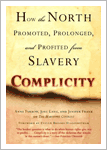By Cate Nolan
Like most Americans, I was taught the version of history that was edited to make white people feel okay and that history was simple.
History is being re-written, though, shattering that “cleaned up” notion of the past and further uncovering how complicated – and racist – our past is.

Complicity: How the North Promoted, Prolonged, and Profited from Slavery, now out in paperback, is one of those histories telling a new story.
Complicity explodes the myth that the North was kind to African Americans in any way other than not legally allowing people to be bought and sold.
Complicity began as a special report about corporate profiteering from pre-Civil War slavery published in The Hartford Courant, where the authors are reporters. It evolved into a comprehensive book about how economics and business interests ruled the United States’ policy on slavery from its inception through the end of the Civil War.
The book exposes the complexities of slavery and economics, and in so doing, the way its history continues to be told. Through all the interwoven issues, though, one thing remains simple: Commerce drove the decisions of the time, not morality or ethics.
The book describes pre-revolution America, suddenly economically cut off from England, desperately needing to generate its own industry and financial independence.
Financial independence started with the “triangle trade.” This is a palatable name for the route that brought food to Africa, where it was traded for people, who were brought to the Caribbean, where they were traded for sugar, which was brought to New England, where it was turned into rum. New England and Mid-Atlantic ports built their cities and industries from the bounty of this trade. Included in the triangle trade were some actual slaves brought to America, but the bulk of money came from the fruits of slave labor in the Caribbean.
Complicity also makes clear that the rich economy of the North was completely tied to that of the South. The North’s brewing, milling and textile riches could only be made with the ingredients shipped up from the rice and cotton fields of the South, and sugar from the Caribbean.
This book is about the elephant in the room of history that is the desire of the North (and of most Northern politicians of the day) wanting slavery to survive as long as it could. In fact, it survived much longer than in most other countries.
(I couldn’t help but see the similarities to businesses today using accepted but illegal practices involving immigrant labor for financial gain.)
Complicity also lays out how business in the state of Connecticut continued to profit from virtual slavery in Africa via the Ivory trade – obviously the result of the author’s initial local reporting, but better pursued as the subject for a separate book.
There are hundreds of pages of history in Complicity‘s argument that were not taught in my school growing up, and probably not yours. Aside from the political and humanistic atrocities outlined in this book, it’s also history that is new and unearthed.
Posted on October 5, 2006


